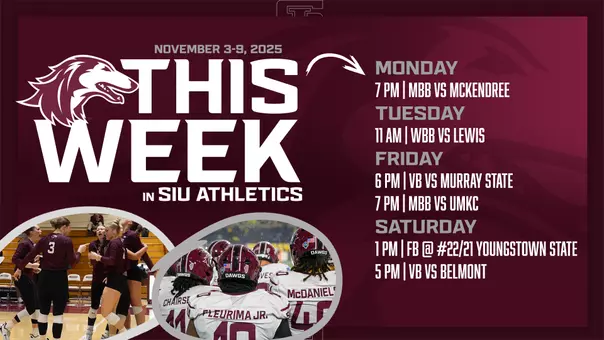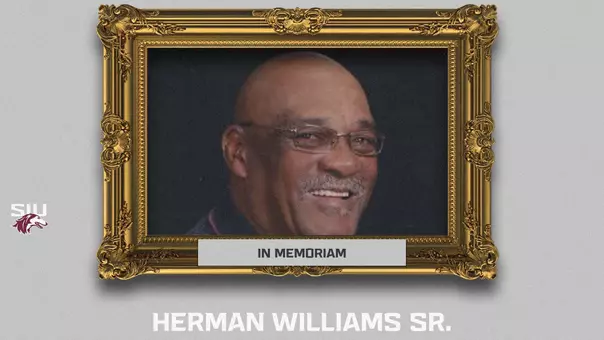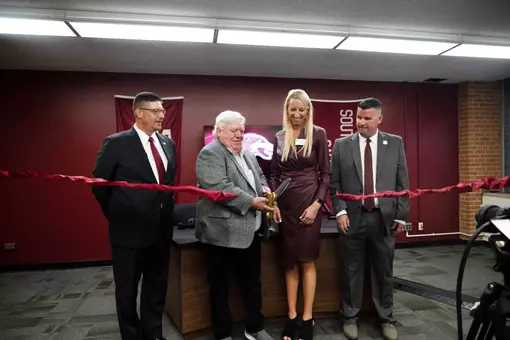
Tommy Bell Monthly Newsletter — November Edition
11/30/2017 | 3:49:00 | General
Greetings, Saluki Nation!
I received numerous Ask the AD questions during the month of November about scheduling - both in men's basketball and football. I've discussed these topics before, but I'd like to use this month's newsletter to provide a more detailed explanation.
Let's start with football scheduling, which is often done years in advance, and which I personally handle. When I first arrived in 2015, our schedule was in disarray with multiple holes that needed to be immediately filled. Since that time, we've developed a philosophy with the following goals in mind - maximize our guarantee profit, position us for a postseason playoff berth, and secure a minimum of five Division I home games.
Since we know that we will always play eight conference games (4 home, 4 away), that typically leaves three non-conference dates to fill per season (although we are permitted to play a 12th game in 2019). My strategy starts with booking one FBS guarantee game per season, and the opponent must be located within a drivable distance so that we can pocket more income instead of using some of the proceeds on airfare. I am pleased to announce that we have booked all of our FBS guarantee games through 2022! Here is the list.
- 2017: Memphis
- 2018: Ole Miss
- 2019: UMass and Arkansas State
- 2020: Wisconsin
- 2021: Kansas State
- 2022: Northwestern
Note that the UMass game in 2019 is a replacement for Liberty. We were supposed to play a return game against the Flames (they came to Carbondale in 2015), but since they are moving to the FBS classification, they requested we flip the date and play UMass.
Now that we have our FBS opponents locked in, I'm working to schedule alternating home and away series with two FCS opponents per season, so that we can consistently have a five-game Division I home schedule. I do not want to play Division II opponents because that could hurt our ability to earn a playoff berth and is a less-attractive game for our fans. Local FCS teams, such as SEMO and Murray State, are natural rivalries and good fits in terms of driving distance.
Finally, I'd like to position our bye week to ideally fall the week before the conference season starts, so we have more time to rest and prepare. This year's team was handicapped by playing 11-straight weeks without a bye.
Switching to men's basketball, scheduling is typically done only 6-12 months in advance of the season and is handled by the coaching staff. This is standard practice in college athletics.
In my estimation, a good men's basketball schedule is one that offers us a realistic pathway to a postseason bid to the NIT or NCAA Tournament, and includes attractive home games for our fans. I've been working with MVC Commissioner Doug Elgin to define what a "good" men's basketball schedule looks like for mid-major such as SIU and will be presenting a series of recommendations to our coaching staff in the near future.
For example, we need to avoid scheduling opponents that have a 3-year average RPI of 250+. Those games not only hurt your own RPI and Strength of Schedule, but drag down fellow conference members.
I have started compiling a list of mid-major opponents that have strong basketball traditions and will recommend we inquire about home-and-home series. We don't necessarily need to stay within our geographic footprint for these games. During our heyday, the Salukis played long-distance series with Saint Mary's, George Mason, Wyoming, Charlotte and Colorado State, and playing those quality mid-major opponents was both attractive for our fans and a key factor in getting at-large bids.
With the recent trend of Power Five conferences expanding to 20-game league schedules, mid-majors will need to work together to fill in the gaps. I talked to one athletic director from a prominent Atlantic 10 Conference school and they are in the same boat we are and would be open to starting a home-and-home series as our RPI improves.
Exempt tournaments are a key piece of the puzzle and could give us the opportunity to play high-major opponents on a neutral court. We have not done so since 2011, but I will make a strong push to be included in these tournaments going forward. We are already booked to return to Las Vegas for the same exempt tournament next year, but for 2019, we'll seek a tournament with high-major opponents.
As I've said many times, basketball scheduling is an art form, but there are still concrete steps we can take to ensure that we play a competitive and entertaining schedule that both prepares us for conference play and positions us for postseason.
 I would like to thank everyone who participated in Giving Tuesday! Your generosity resulted in gifts totaling $34,000, which is a 50 percent increase over last year. We easily surpassed our goal of funding one scholarship in one day. All proceeds go directly to the Saluki Athletic Scholarship Fund to support our more than 350 student-athletes.
I would like to thank everyone who participated in Giving Tuesday! Your generosity resulted in gifts totaling $34,000, which is a 50 percent increase over last year. We easily surpassed our goal of funding one scholarship in one day. All proceeds go directly to the Saluki Athletic Scholarship Fund to support our more than 350 student-athletes.
 I'm pleased to announce that our Coats For Kids program has been extended for two more games. We're working with the Carbondale Police Department and SIUC Department of Public Safety to collect new coats for boys and girls ages 1-8. These are children living right here in southern Illinois who need a warm coat to get through the winter. Please help us if you're able, by dropping off a new coat in one of the collection boxes at the entrance to SIU Arena at either the Dec. 2 or Dec. 9 men's basketball games.
I'm pleased to announce that our Coats For Kids program has been extended for two more games. We're working with the Carbondale Police Department and SIUC Department of Public Safety to collect new coats for boys and girls ages 1-8. These are children living right here in southern Illinois who need a warm coat to get through the winter. Please help us if you're able, by dropping off a new coat in one of the collection boxes at the entrance to SIU Arena at either the Dec. 2 or Dec. 9 men's basketball games.
 Finally, I'd like to welcome the newest member of the Dawg Pound - Chancellor Carlo Montemagno! He threw a pizza party for students prior to last night's basketball game versus SIUE and then sat in the Dawg Pound and helped lead the cheers. He truly understands how important intercollegiate athletics is to having a vibrant campus and community.
Finally, I'd like to welcome the newest member of the Dawg Pound - Chancellor Carlo Montemagno! He threw a pizza party for students prior to last night's basketball game versus SIUE and then sat in the Dawg Pound and helped lead the cheers. He truly understands how important intercollegiate athletics is to having a vibrant campus and community.
With Saluki Pride,





